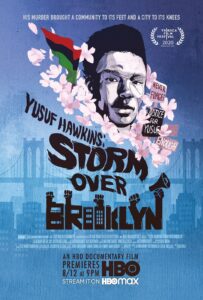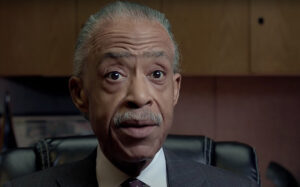Film Review: “Yusuf Hawkins: Storm Over Brooklyn” Skillfully Tells Story of Tragedy While Highlighting Dreadful Racial Tensions of Late 1980s
Written by: Matt Patti | August 11th, 2020

Yusuf Hawkins: Storm Over Brooklyn (Muta’Ali Muhammad, 2020) 3½ out of 4 stars.
In late-1980s Brooklyn, New York, a racially-charged tragedy occurred that would spark outrage in the black community. Yusuf Hawkins, a 16-year-old black teenager from East New York, a predominantly black neighborhood, traveled with some friends to the neighborhood of Bensonhurst, a predominantly white part of town made up of primarily Italian-Americans. Yusuf was traveling there to check out a car he saw an ad for in a newspaper. Coincidentally, on that same night, a local girl in Bensonhurst named Gina was having her birthday party and told people that she was inviting her black friends, including her black boyfriend. Unfortunately, many of the white boys in the neighborhood were against that idea. While in Bensonhurst, Yusuf and his friends were approached by a large number of those white boys wielding bats, vowing to punish them for coming to Bensonhurst, thinking they were Gina’s friends. Surrounded, Yusuf and his friends were trapped on the city block with no escape. One of the white boys was wielding a gun and fired at Yusuf, killing him. In the coming months and even years, this tragic death would spark protests, marches and riots through Bensonhurst as the black community (and others) demanded justice. The protestors were irate that Yusuf’s killer had not been charged or found yet, and they would not stop until justice was rightfully served.
The visual storytelling on display in Yusuf Hawkins: Storm Over Brooklyn is excellent, and completely engages the viewer in the story. The filmmakers use drone footage and map images to show the streets where certain events happened from a bird’s-eye perspective. On this footage and/or these images, they place differently colored dots that represent different people and show, based on the movement of the dots, where these people went and what occurred where. Accompanied by intriguing interviews and first-hand testimony from police reports, the film gives viewers the most accurate description of what happened the night Yusuf was killed. However, the events of his death are only a small part of the documentary. The ensuing marches, protests, and demands for justice and change are the focal point going forward, and with great use of archival footage, the film puts the viewer right in the middle of it all.

The film also does a great job of getting the right people in front of the camera. The interviews are conducted with not only Yusuf’s friends and immediate family members, which could be expected, but also with eyewitnesses of the incident, government officials of the area at the time, a variety of social-justice activists, including Reverend Al Sharpton, and even some with those directly involved in attacking Yusuf and his friends. The documentary gathers a bevy of different perspectives from different people and lets the audience decide for themselves with whom they agree. Everyone in the film admits that Yusuf Hawkins’ death was a tragedy, but some believe that it was not racially charged. Others acknowledge that Yusuf was killed because of the color of his skin, but that the subsequent marches or riots were unnecessary and only furthered the racial tensions in Brooklyn. Still others say the protests were completely justified and the only way to get justice. Any documentary that covers all aspects and sides of a topic with different interviews automatically gets my respect. So many documentaries will take one side and stick with it, only featuring interviews with people that will support their agenda. It is much more interesting to see how all different types of people react to an event.
The only thing that this documentary could do better would be to spend a bit more time talking about who Yusuf was when he was alive. We get a little bit of this at the beginning of the film and see that he was a young man with a bright future, but not nearly enough of it. I understand the main focus of the film is the aftermath and the fight against injustice, but a tad more exploration of who Yusuf was as a person could have even more impact on the film overall. However, the film is quite long for a documentary, at 1 hour 40 minutes, so I can see why they might not have had time to include more of it. Overall, Yusuf Hawkins: Storm Over Brooklyn does a terrific job examining a horrible tragedy and provides valuable insight through great visual storytelling, intriguing opinions and testimony from all involved, and showcases the inexcusable targeting of someone based solely on the color of their skin. It also shows what can be accomplished when a group of people come together and tirelessly demand justice, as Yusuf’s killer is finally found and charged after so many marches and protests. This documentary has many parallels to what is happening in the United States today, with many of the competing opinions about protests and racism mirroring what many see on their social-media timelines. I think this film can surely serve as an inspiration to those who fight for justice in our current era.


